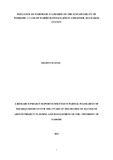| dc.contributor.author | Maingi, Sharon | |
| dc.date.accessioned | 2013-02-12T14:48:17Z | |
| dc.date.available | 2013-02-12T14:48:17Z | |
| dc.date.issued | 2012 | |
| dc.identifier.uri | http://erepository.uonbi.ac.ke:8080/xmlui/handle/123456789/9633 | |
| dc.description.abstract | The purpose of this study was to find out the influence of Fairtrade standards in improving the sustainability of workers at Waridi flower farm in Athi River, Machakos County. The objectives were to determine the extent to which social development standards contributes to sustainability of workers at Waridi flower farm; to establish the influence of economic development standards on sustainability of flower workers at Waridi Flower Farm; to find out whether environmental development standards affects sustainability of flower workers at Waridi Flower Farm and to find out the challenges faced in the implementation of Fairtrade standards at Waridi Flower Farm.
The study adopted the case study approach. The target population was drawn from Waridi flower farm at Athi River. The researcher's target was 400 employees in the farm. A sample of 30% from the population as a whole was be taken using simple random sample which was to give each item in the population an equal probability chance of being selected. The sample size was 120 employees working at Waridi flower farm. Primary data was collected through the use of a questionnaire. The study found that there was no discrimination in the farm. The management had appointed a person responsible for Fairtrade matters.
The study revealed that Fairtrade contributed to environmental management. They had a tree nursery project. The study found that the salary paid to workers was enough to take care of their families. There were premium-funded projects in the area. Waridi produces Fairtrade certified flowers which are sold within the country and abroad to its customers. The respondents were requested to indicate if workers had a second source of income or a spouse engaged in some form of employment. The study concludes that the employees at Waridi flower farm were aware of Fairtrade standards. They had trade unions in the farm. Pesticides were used in the farm to a moderate extent. They were trained on how to handle pesticides and other hazardous chemicals. The workers children were sponsored for secondary education.
The study recommends farm managers need to ensure that their workers are educated on Fairtrade standards. The study recommends other flower and horticulture farms to enroll their farms to the Fairtrade standards. They need to train workers on how to handle pesticides and other hazardous chemicals. They should treat and recycle water in the farms. | en_US |
| dc.language.iso | en_US | en_US |
| dc.publisher | University of Nairobi, Kenya | en_US |
| dc.title | Influence of fairtrade standards on the sustainability of workers: a case of Waridi Flower Farm in Athi River, Machakos County | en_US |
| dc.title.alternative | Thesis (MA) | en_US |
| dc.type | Thesis | en_US |

